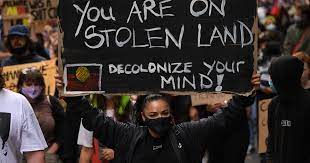THE INVISIBLE EVIL - AUSTRALIA
- makfor9
- 20 ago 2021
- Tempo di lettura: 3 min
Aggiornamento: 11 nov 2025
The University of Queensland Art Museum, in Brisbane, has become a leading institution, showcasing progressive and contemporary art. Their exhibitions aim to contextualise issues facing Australian society, that can also be transposed to larger, global issues. Their latest exhibition, titled ‘Conflict in my Outlook – Don’t Be Evil’, opened this weekend. The exhibition offers a commentary on the way in which the internet has permeated our lives. As the largest surveillance system we have ever known, the internet has become a invisible mechanism for the extraction, analysis and sale of our personal data.
The exhibition aims to materialise the invisible power structures that covertly operate within these internet systems. Taken from Google’s old corporate motto, ‘Don’t Be Evil’ speaks to these power structure’s sinister nature.
It is undeniable that the internet has pervaded our lives. Everything from our personal banking, university courses and communication with friends occurs on apps and websites, instantaneously accessible through handheld tablets that sit on our bedside tables. Our personal use of the internet, although seemingly innocent, is part of a larger more sinister entity, that has infiltrated democratic processes, capitalism and our social relations; forces that we as individuals have very little control over.
One piece in the exhibition, On Demand (2019) incorporates these themes through visitor participation. Australian artist, Eugenia Lim, created a bicycle powered video work. The video was created in conjunction with gig-economy ‘worker-performers’, a new type of digital worker within companies like Uber Eats and Airtasker (2 companies that are very popular in Australia) – where a worker’s performance, productivity and efficiency is held to an unattainable standard. Using experiences of these workers, On Demand explores the political structures that facilitate the exploitation of their labour. These workers aren’t offered job security, personal safety and income guarantee, placing them in a precarious position where they can easily be exploited. We, the consumer, allow this exploitation, by using a company that offers ridiculously low prices, which allows them to pay its workers ridiculously low wages.
To watch the video, the visitor must ride a bicycle. The human power from riding the bicycle powers the video. The human labour necessary to watch the video symbolises the exploited labour of workers within these industries. Where they must push their labour to the ultimate extent, to meet unrealistic standards, all to receive a minimum wage income. It also places the onus on the visitor; to experience the video, they must use their labour. When the visitor stops riding, the video stops playing. When the worker stops meeting targets, they stop being paid. It is a simplistic, yet profound meaning behind an issue permeating Australian society.
Uber Eats, one of these companies, is incredibly popular in Australia. It is a food delivery service, where customers purchase food via an app and an Uber Eats ‘delivery rider’ collects it from the restaurant and delivers it to the customer’s house. Last year, 5 Uber Eats riders died in 3 months while delivering food, Australia wide. Uber Eats failed to recognise the deaths as ‘workplace fatalities’, and the families of the victims were subsequently unable to claim compensation. Under this type of gig-economy, the larger company (Uber Eats) contracts the delivery riders as independent contractors. It means the larger company isn’t responsible for the physical and financial protection of the riders. This has shown how underregulated this new gig-economy industry is, and how vulnerable these workers are.
The exploitation of gig-economy workers, and their need for safety, is an ongoing conversation in Australia, one that must ultimately outline and protect the rights of these workers. ‘Don’t Be Evil’ offers an outlet for this conversation through an accessible public environment; an art museum. It allows visitors to engage with these issues and openly discuss them, while the larger decision making unfolds on a government level. The exhibition’s commentary on the internet is critically important, as our dependency on the internet increase. However, the invisible evil is that the internet’s exploitation of us simultaneously increases. The more we use it, the more it uses us. Think about that as you read this article, via the internet.




Commenti